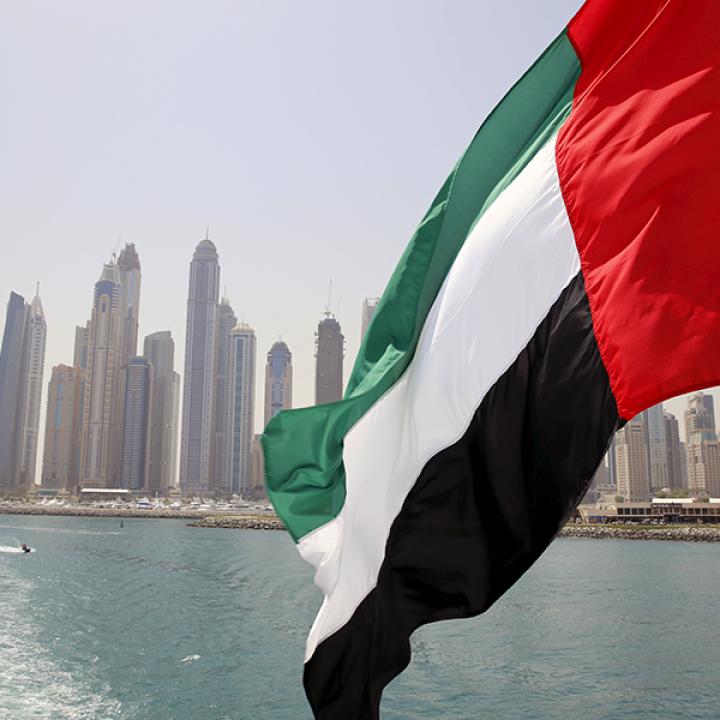
- Policy Analysis
- Fikra Forum
UAE Public Overwhelmingly Backs Tough Line On Iran – But Not On Qatar or Muslim Brotherhood

October 12, 2017
As President Trump unveils his revised U.S. strategy to contain Iran, surveys reveal that key Arab publics in the region share his antipathy toward Tehran. Previously reported polls from Jordan, Saudi Arabia, and even Qatar, sometimes depicted as pro-Iranian, demonstrated solid majorities in each country with unfavorable attitudes toward Iran’s regional role. Now a rare independent survey of United Arab Emirates citizens shows that they too overwhelmingly agree -- by a margin of 86 to 11 percent -- with their government’s negative view of current Iranian policies in the region.
Notably, the UAE’s small minority of Shia Muslim citizens (roughly 11 percent of the total, as measured by this survey) also agrees with that assessment -- albeit by the much narrower margin of 59 percent to 39 percent. To be sure, the UAE is clearly not an electoral democracy, where public opinion may have a direct impact on foreign policy. Yet this level of popular endorsement across the society, especially for a difficult or potentially divisive Emirati government position, is bound to be a reassuring and stabilizing factor.
In sharp contrast, popular attitudes toward both Qatar and the Muslim Brotherhood are much more divided, and thus partially at variance with UAE government policy. This signals a possible source of discontent or pressure from below for some form of rapprochement with those two objects of official ire. Between the two, compromise with Qatar seems both more popular and more politically feasible than any UAE opening toward the banned Muslim Brotherhood. Moreover, compromise with Qatar might help cement greater GCC consensus against Iran; while any official opening to the Muslim Brotherhood would almost certainly complicate the UAE’s close ties to Saudi Arabia and Egypt.
As for Iran’s regional allies, they fare no better than Iran itself in overall Emirati public opinion. The Houthis of Yemen are rated favorably by just 7 percent of the citizenry as whole; Hezbollah, by just 10 percent. In the latter case, however, Shia Emiratis diverge from their compatriots, with a narrow majority (57 percent) still giving Hezbollah positive reviews. Equally striking is the very low proportion, a mere 11 percent of the total, of those who think it is even “somewhat important” for the UAE to have good relations with Iran. By comparison, the corresponding figures for relations with the U.S., Russia, Turkey, or China are in the 40-50 percent range.
Moreover, asked to select their first and second priorities for U.S. Mideast policy, the winner is “increase its practical opposition to Iran’s regional influence and activities.” In last place is “push harder to resolve the Palestinian-Israeli conflict,” behind countering jihadi terrorism or addressing the crisis in Yemen. And asked about the ongoing Qatar-GCC dispute, two-thirds of Emiratis say that “the most important issue” is “to find the maximum degree of Arab cooperation against Iran.”
On other aspects of their government’s conflict with Qatar, however, the UAE public tends to prefer a softer line. Surprisingly, a narrow majority actually disagrees with the boycott of Qatar, by a margin of 52 to 46 percent. Instead, the clear majority (72 percent) want “a compromise, in which all the parties make some concessions to each other to reach a middle ground.” And one-third admit that “in this situation, Arab countries need help from outside powers like the U.S. in order to overcome their differences.”
This split in Emirati public opinion appears linked to one of the central issues at stake in this intra-Arab argument: the fate of the Muslim Brotherhood. Qatar has supported it. But the governments of the UAE, Saudi Arabia, and Egypt, which once at least tolerated the Brotherhood, have now outlawed and even officially denounced it as a terrorist organization – and are boycotting Qatar, in large part over this acute disagreement.
Nevertheless, the UAE public splits on this key question: Should each Arab country “have every right to decide for itself what political and religious groups to host or support, no matter what others think?” A slim majority of Emiratis disagree with that assertion. But nearly half (44 percent) agree with it, in effect siding with Qatar on this aspect of its dispute with the UAE and its closest Arab allies.
In this connection, and perhaps most unexpectedly of all, fully one-third of Sunni Emiratis (who comprise nearly 90 percent of all citizens) say they have at least a “somewhat positive” opinion of the Muslim Brotherhood. This figure has hardly changed since the previous such poll, two years ago, notwithstanding a very public official campaign against that organization. It suggests that a significant minority still harbors some quiet misgivings about their own government’s uncompromising position on this point. As a result, either policy or public diplomacy adjustments would be useful to secure greater consensus on this still very controversial question.
The survey was conducted in August, by a highly qualified (and completely apolitical) regional commercial firm, using face-to face interviews among a representative national sample of 1,000 citizens of the UAE. The statistical margin of error for such a sample is approximately 3 percent. Given this professional methodology and strict assurances of confidentiality, the findings present an unusual, very credible portrait of public opinion in this distinctive Arab society, relatively open socially yet politically much less accessible.



